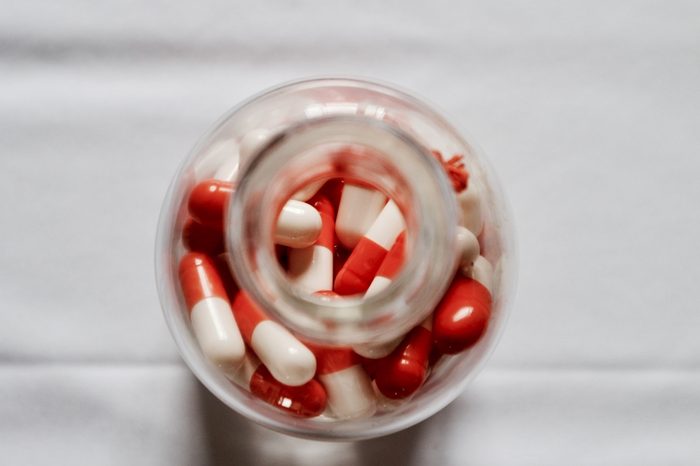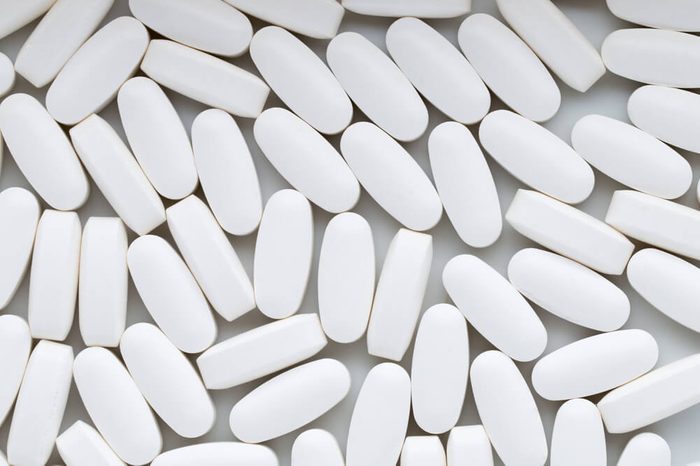
Your genetics prefer storing fat in your stomach area
Although genetics don’t automatically doom you to a large belly, they do play a significant role in fat distribution and storage, according to Michael Nusbaum, MD, a bariatric surgeon, and the founder of Healthy Weight Loss Centers. Visceral fat—the type of fat the body stores in your abdomen and around your intestines and is mostly responsible for keeping people from a flat belly—is partly to blame because of genetics, Dr. Nusbaum explains. “There are people who, no matter what, are going to basically be prone to having the same belly as their mom or dad,” he says. Check out this 10 second abs move that will transform your core.

You have food allergies or food sensitivities
Genetics also play a role in food allergies and food sensitivities, according to Dr. Nusbaum. These food issues could also be to blame for excess belly fat and bloat. For example, he says, “If you are African American and your genetics are purely from sub-Saharan Africa, where [your ancestors] didn’t have corn, and you love your sodas and are drinking tons of high-fructose corn syrup, you’re going to store that away as fat because your body can’t metabolize it preferentially.” So not all food allergies result in hives or breakouts; some trigger things like inflammation and abdominal distention, or expansion of the stomach and waist, making the belly less flat. Another common example is gluten sensitivity or celiac disease. Think about adjusting your diet to include these 7 foods that are proven to flatten your belly.

Your gut microbiome is off-balance
If your gut microbiome is off-balance, you’ll end up with gas, bloating, and a not-so-flat stomach, Dr. Nusbaum says. Pamela Merino, MD, an internist in Miami, Florida, says, however, that more research is necessary into how gut health affects fat storage specifically. Dr. Merino points to research showing that stool transplants from thin people to overweight people result in weight loss—and the only explanation is that thin people’s microbiomes are better at burning fat. Healthline also reports that gut bacteria may have an impact on how the body digests different foods and nutrients. For example, a specific kind of gut bacteria digests fibre, which may lead to weight loss, according to Healthline. Gut bacteria also controls whether or not you feel hungry or full, which can affect your weight. Want to improve your gut health? Here are some of the best foods.

Your hormones are out of whack
Changing hormone levels is one reason people might gain weight during menopause, especially around the abdomen, according to Eldred Taylor, MD, an obstetrician-gynecologist in Atlanta, Georgia. After menopause, fat tissue produces estrogen, and estrogen causes fat storage, creating a vicious cycle, Dr. Taylor says. Different factors can cause hormonal imbalances like this, leading to weight gain. (Here’s how to make your own hormone balancing adaptogen blend.) Stress is a common one that Dr. Taylor especially sees in menopausal women. “Stress blocks ovulation, and when women stop ovulating, they don’t make progesterone,” he says. Progesterone is essential because it helps burn fat for energy, Dr. Taylor explains.

You have hypothyroidism
Thyroid diseases cause a slower metabolism, predisposing people to accumulate more fat, according to Dr. Merino. “The thyroid is almost like the orchestra director setting the pace for everyone,” she says. “Your thyroid literally sets the pace at which all the organ systems are going to work, so if it is slow, all the other systems are going to go slow, and we tend to gain weight.” Plus, this slowdown causes more fatigue because the body lacks the fuel and direction to go faster, ultimately resulting in less calorie burn, according to Dr. Merino. Myxedema, a rare but life-threatening thyroid problem causing fluid accumulation in the tissues, gives the appearance of excess fat, too, Medical Daily reports. Check out these 13 thyroid facts everyone should know.

You’re taking steroids
Perimenopausal women taking steroids to combat hormonal changes are especially at risk of extra weight gain, according to Dr. Nusbaum. Not only does fat distribution change during “the change” itself, but steroids used to rebalance hormones can also cause extra fat deposits specifically in your stomach area, according to the Hospital for Special Surgery. This excess fat storage also applies to people using steroids to help other health issues, such as inflammation, Dr. Nusbaum says. Find out exactly how long you need to hold a plank to flatten your belly.

You’re taking antipsychotics or antidepressants
Antipsychotics and antidepressants are also known to cause significant weight gain, which could result in a less-than-flat belly, Scientific American reports. Dr. Merino agrees that antipsychotics and antidepressants are some of the worst offenders when it comes to medication-related weight gain because they can affect insulin (more on that later). That said, it really depends on the specific type of drug, Dr. Merino says. Learn the 9 daily habits that can help banish belly bloat.

You’re taking insulin
Insulin is an anabolic steroid, according to Dr. Merino, who says, in the end, it essentially causes muscle loss and more fat creation. Taking insulin causes various chemical reactions in the body to help absorb glucose and manage blood sugar. Weight gain is a normal side effect, Healthline reports. The body converts the extra or unused glucose from insulin and stores it as fat—with the belly as a central storage location, Dr. Nusbaum says. Insulin also changes the depositing of fat and how we process it, Dr. Merino says. And people taking antidepressants or antipsychotics are actually at high risk of developing insulin resistance, according to Dr. Merino. Next, check out the 10 worst foods for your stomach.
